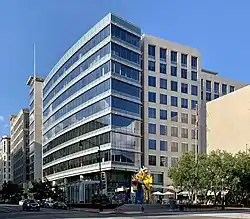Pepco
The Potomac Electric Power Company (PEPCO) is a public utility that supplies electric power to the city of Washington, D.C. and to surrounding communities in Maryland. It is owned by Exelon.
 | |
 PEPCO headquarters in Washington, D.C., in 2020 | |
| Industry | Utilities |
|---|---|
| Founded | April 28, 1896 (as Potomac Electric Power Company) |
| Founder | Oscar T. Crosby |
| Headquarters | United States |
Area served | Washington metropolitan area |
| Products | Electric power |
Number of employees | 1,429 |
| Parent | Exelon |
| Website | www |
The company's current trademarked slogan is "Your life. Plugged in." Its former slogan was "We're connected to you by more than power lines."
Pepco's bulk transmission system consists of transmission lines operating at 115 kV, 138kV, 230 kV and 500 kV. Pepco has interconnections with Potomac Edison (230kV, 500kV), Baltimore Gas and Electric (500kV, 230kV, 115kV), and Dominion Virginia Power (500kV, 230kV).
History
The company's predecessor, Potomac Electric Co., was organized in 1891 to provide street lighting and streetcar power in Georgetown and Northwest D.C.[1] After suffering during the Panic of 1893, the company filed bankruptcy and, on November 6, 1895, was acquired by Oscar T. Crosby and Charles A. Lieb for $5,500.[1]
The company was incorporated as Potomac Electric Power Company on April 28, 1896 in Virginia. It became a subsidiary of the North American Company, which owned the Washington Traction and Electric Company, one of the private streetcar companies in Washington.[1]
On December 17, 1896, after a court battle, the company received a contract to light the city of Washington D.C.
In January 1889, the company merged with its rival, United States Electric Lighting Company.
In 1899, the company merged with Washington Traction and Electric Company.
In June 1901, the company filed for bankruptcy and was acquired by the Washington Railway and Electric Company.
In 1905, revenues exceeded $1 million for the first time.[1]
In 1906, the company began construction of the first unit of the Benning Road Power Plant, along the Anacostia River. When its last unit was completed in 1931, the power plant had a 185,000-kilowatt capacity.
In 1928, the North American Company gained control of Washington Railway and Electric.
The Public Utility Holding Company Act of 1935 forced the North American Company to divest itself of either their streetcar operations or its power generating utility.[2] Since power generation was far more profitable, North American choose to divest itself of the transport entity.
In 1954, revenue exceeded $50 million for the first time.[1]
In 1969, the company suspended its dividend due to rising costs.[1]
In 1980, the company cancelled plans to build a $930 million power plant in Montgomery County as a result of reduced demand.[3]
In September 1995, the company announced a merger with Baltimore Gas & Electric;[4] however, the merger was cancelled in December 1997.[5]
In 2001, the company was reorganized and became a unit of Pepco Holdings. In 2003, the holding company took over Pepco's investment subsidiary.[6]
On March 23, 2016, the company was acquired by Exelon.[7][8]
Controversies
Most hated company in America
In 2011, Business Insider named the company first on its list of "The 19 Most Hated Companies In America" based on its American Customer Satisfaction Index rating.[9]
Poor reliability and outages
An investigation by The Washington Post in 2010 faulted Pepco for poor reliability. The report noted that the company's performance had slipped since 2005, comparing poorly to other major utilities in the frequency and duration of power outages. Thousands of people lost power for as many as five days after only 5-8 inches of heavy wet snow.[10]
During the June 2012 North American derecho, more than half of the customers in Montgomery County, Maryland lost electric power. The company was criticized for being slow to restore power and for charging its customers for the power outage.[11]
Environmental impact
The company's Benning Road Power Plant produced air pollution that negatively affected neighboring communities. In 2017, the company agreed to pay regulators $1.6 million for violations of the Clean Water Act.[12]
References
- Hamilton, Martha M. (April 26, 1996). "THE COMPANY THAT STAYED CURRENT". The Washington Post.
- North American Co. v. Securities and Exchange Commission, 327 U.S. 686 (1946). FindLaw.com
- Knight, Jerry (June 20, 1980). "Pepco to Build No New Plants For Ten Years". The Washington Post.
- Southerl, Daniel (September 26, 1995). "PEPCO TO MERGE WITH BALTIMORE GAS & ELECTRIC". The Washington Post.
- Hamilton, Martha M. (December 23, 1997). "PEPCO, BALTIMORE GAS CANCEL TWO-YEAR-OLD PLAN TO MERGE". The Washington Post.
- Clabaugh, Jeff (June 17, 2003). "Pepco Holdings absorbs investment arm". American City Business Journals.
- "Pepco Holdings and Exelon Close Merger Following Approval by the Public Service Commission of the District of Columbia" (Press release). Exelon. March 23, 2016.
- Dance, Scott (March 23, 2016). "BGE owner Exelon closes $6.9 billion deal to buy Pepco". Baltimore Sun.
- Lubin, Gus; Giang, Vivian (June 29, 2011). "The 19 Most Hated Companies In America". Business Insider.
- Stephens, Joe; Flaherty, Mary Pat (December 5, 2010). "Why Pepco Can't Keep the Lights On". The Washington Post.
- Mallonee, Mary Kay; Olabanji, Jummy; Roussey, Tom (July 16, 2012). "Pepco, BGE to make money from power outage". WJLA-TV.
- "The Justice Department and EPA Reach Clean Water Act Settlement with Pepco to Reduce Pollution to Anacostia River" (Press release). United States Department of Justice. January 13, 2017.
External links
| Wikimedia Commons has media related to Pepco (Potomac Electric Power Company). |